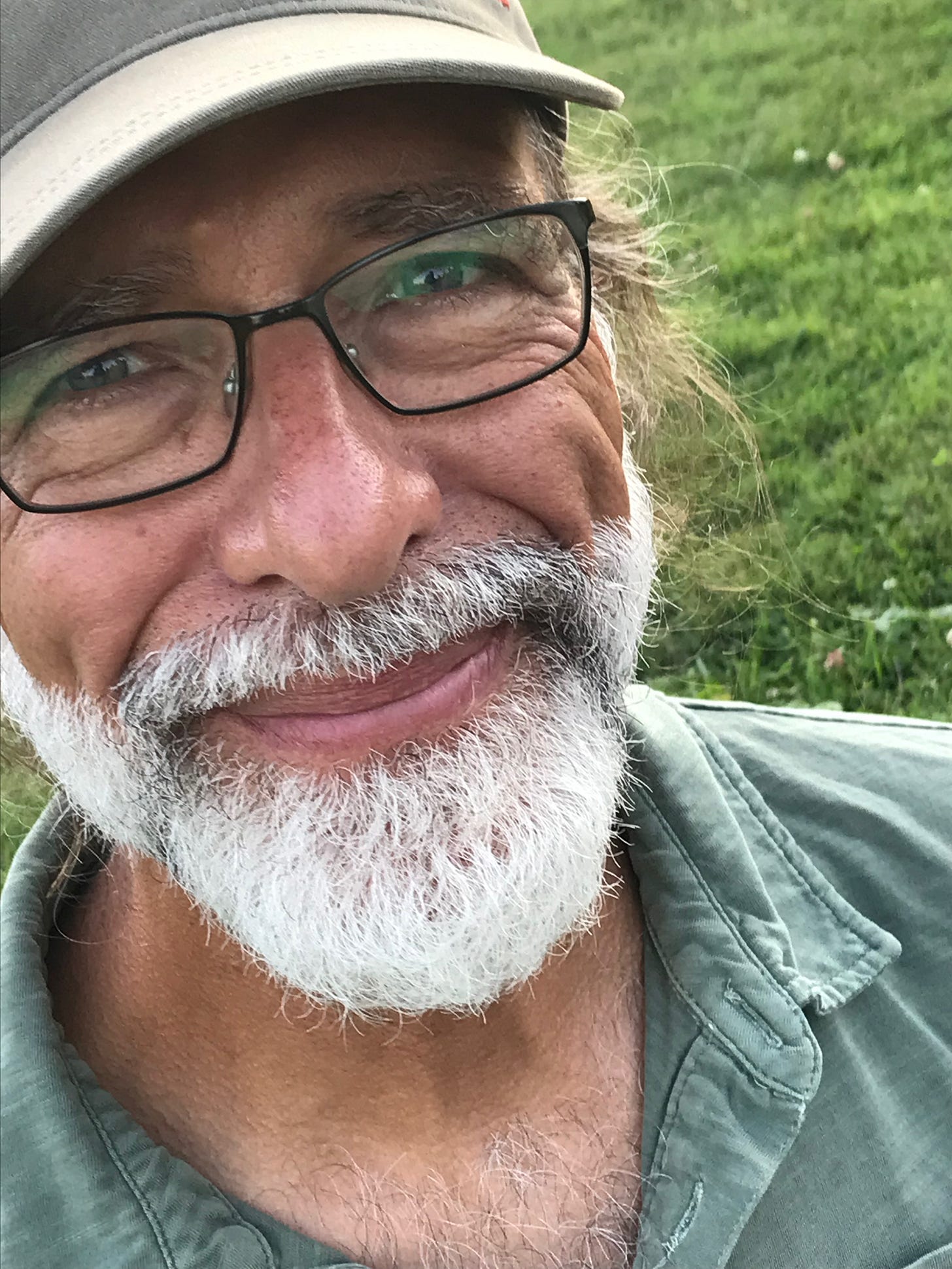Hello. I’m Don Boivin and this is Shy Guy Meets the Buddha. Thanks for being here. If you like what you are about to read, please consider a small token of appreciation; a tip or paid subscription would be very generous and so helpful. Thank you! 🙏 (“Buy Me a Coffee” is an online tipping platform where you can tip as little as $5 to your favorite hard-working writer 😊)
1. You’re trying to meditate but you can’t seem to focus on your breath for more than five seconds. Your back hurts. You glance at the clock; What! It’s only been ten minutes! Maybe you’re just not cut out for this.
2. You’re walking on a quiet wooded path and thinking about the book you’ve been reading on mindfulness. You try to be more aware of your surroundings, more present to the here and now. Give me a sign, you say to the trees. Share your wisdom with me. The trees quietly whisper, but you’re not sure you understand their language, and though you feel calm and relaxed, your walk must inevitably end, and as you drive home, you remember that tomorrow is Monday. The anxiety comes creeping back.
3. You’ve been struggling with this idea of “universal consciousness.” You’ve read so many books on non-duality. You are not you, they say, you are the witness of you, the one who is aware of awareness, the Absolute. That all sounds great but it doesn’t really resonate with your lived experience. Are you just too ignorant or unsophisticated to perceive these complex concepts? How will you ever achieve enlightenment if you don’t really get the truth of the wise teachers?
Don’t Let Anyone Make You Question Your Intellectual or Mental Capacity
A common view is that to intellectually understand Buddhist or mindfulness concepts like non-self, emptiness, impermanence, or inter-dependence is not enough, that one must grasp these ideas at a deeper, more visceral and core level in order to truly experience them, to live them, to rise above the self, to awaken, to obtain enlightenment.
I challenge this view.
The experience of “me,” of a separate self who is observing, possessing, and controlling my thoughts, my body, my feelings, my entire experience—in other words, the ego—is deeply ingrained in the psyche (by both nature and nurture) and constantly reinforced by acts of living and surviving in a community of others. It’s not something that goes away simply because you realize it’s an illusion, no matter how deeply you get it. The ego is always going to be a part of the human experience. Having a sense of self is not a flaw or a mistake that we must dedicate ourselves to overcoming; it’s an evolutionary survival tool.
Granted, just as we can ruin our health by gorging on sugar—a provision mostly unavailable to early, evolving humans—our ego, in a competitive world, can become overblown and all-consuming, leading to mental health issues and deep unhappiness. That is where understanding the true nature of self can be helpful. But it’s a fantasy to believe that enlightenment comes when one “sees once and for all” through the illusion of self, and that this great awakening will lift us to a higher plane of consciousness, one that is free of illusion and suffering.
No Part of Our Innate Structure is Wrong
We are human beings, not gods. And our faculties of consciousness—and all of its processes—are intrinsic, human faculties, not disposable excesses we can be rid of through an act of will, an act that would have to be initiated by that self-same mechanism. Can a hand sever itself? An eye see itself? Whenever I find myself wanting to conquer my ego, I ask, “Who will do the conquering?” Yeah; the ego. This kind of thinking is a vicious and never-ending circle.
(I grant that there are a few people who have experienced sudden, profound, permanent shifts in their understanding of self, shifts that have changed the course of their lives. I believe these are lucky quirks of nature and brain function, exceptions to the rule—certainly not decisions made by those who experienced them—and should not be held up as model lessons for the rest of us. For most, awakening is gradual, like any natural learning process.)
I recently came across this passage about meditation in my copy of Food for the Heart: The Collected Teachings of Ajahn Chah. This is from his essay, “Still, Flowing Water”:
Whenever we sit, the mind immediately goes running off. We follow it and try to bring it back and observe it once more. Then it goes off again. This is what you’re supposed to be studying! Most people refuse to learn their lessons from nature... They don’t want to see the mind changing. But then how are you going to develop wisdom? We have to live with change like this. When we know that the mind is just this way, constantly changing, when we know that this is its nature, we will understand it.
“We have to live with change like this,” the author wisely states. Not overcome it. Last week when I read this passage, I noticed my own scribbled note in the margin from an earlier reading: “So many people are seeking some permanent state. There is none!”
Spiritual Path, or Labyrinth with No End?
My issue with the teaching that there is a difference between intellectually understanding a lesson, and grasping it at a deeper level, is that the questionable notion helps maintain the illusion of and indulgence in our deep craving for a permanent state called enlightenment, a place where we believe all our suffering will go away; we believe the goal, though just out of reach now, is still attainable if only we can somehow understand the teachings at a deeper level (which, incidentally, sounds an awful lot like “If you don’t feel God’s love, your faith must not be strong enough.”)
Note that this belief in the unattainable is what keeps us buying spiritual books and signing up for spiritual retreats.
The very path of seeking we’re on can so often lead to self-doubt, prolonging our belief that someone else knows better than we do, keeping us perpetually searching for spiritual chimeras instead of “learning our lessons from nature”; nature being the very mind, body, and consciousness we crave to transcend.
The Good News
Sorry to be such a pessimist. The good news is that outside of this enlightenment business, and Dharma teachings that lead us to doubt the depth of our understanding, meditation and mindfulness are not a waste of time. To the contrary; for me at least, they are the best thing ever!
Thinking and feeling are like that harmful sugar habit; we over-indulge because we can. Living in a highly developed, technological, media-lubricated world that was never even conceived of by the forces of evolution puts us in a position where some discipline is called for. We can’t stop thinking, but we can certainly observe our own psychological behavior more closely and learn from it. Those bullet points of doubt and confusion at the beginning of this essay? They are not failure; they are the lesson plan, they are opportunity!
In a recent Substack Note, I complained that I felt offended at something someone had said to me. My friend
commented, “Being offended is good, because then you can go looking for “who” is offended.”When I practice mindfulness, I begin to see more clearly the thought processes, the indulgences, the unexamined and mistaken views that are doing me more harm than good, such as believing my own defensive or angry feelings when someone criticizes me or if I fail to get what I want, or spending too much time regretting the past or projecting my fears into the future, or how I’m trying to emulate the path of another human being’s awakening instead of directly experiencing my own understanding of my own nature.
It’s Not Easy to Rock the Boat, Especially When It’s Filled with “Masters”
We’re not all mavericks, free-thinkers, dissenters and disrupters. In fact, I’d guess most of us aren’t. I, for example, am such a ridiculously late bloomer; as a youth I was perpetually dissatisfied because my heart told me that the life I was entering had some serious flaws but my mind told me it would be naïve and dangerous to buck the traditions of my family’s conservative approach to faith, career, and adult responsibilities. I was taught not to rock the boat. Consequently, it took me many decades to gain the strength and courage to question the guidance of my teachers, to find my own answers, and probably most importantly, to accept that there are some questions that simply cannot be answered, unknowns of ultimate things for which no guru, teacher, or writer can provide clarity.
Question everything. Boats are made to rock, even the ones you think are taking you to paradise.
Once you start thinking for yourself, refusing to accept common and comfortable answers, walls start to crumble, and light slowly seeps in. Liberation isn’t finding new answers to replace the old ones. It’s simply clearing some free space, rather than rushing to fill our heads with concepts and finalities.
Perhaps that quiet, untranslated whisper of the trees we queried during our walk in the woods is the only answer we really need.
In Closing
I’ll finish by offering some short commentary on those three bullet points.
1. If you feel restless during sitting meditation, allow that feeling to become the focus of your meditation. It’s the perfect opportunity to learn more about yourself!
2. You can go back to that wooded path as often as you like; after work, on the weekends, maybe even during your lunch break. You may even learn the language of the trees!
3. If “Universal Consciousness” or “Eternal Self (Atman)” or any other so-called final answer to profound questions doesn’t ring true for you, I say don’t worry about it. Does the provider of these answers actually know they are true, or are they just presenting conjecture as fact?
DB 🙏💚
Thank you for reading Shy Guy Meets the Buddha: Reflections on Work, Love, and Nature. If you enjoyed this essay and would like to show your support, please consider becoming a valued patron for only $5 a month. Or if you like, a one-time tip would be fabulous. Thank you! 💚








Thanks for being real about this stuff, Don. I particularly liked these words: "Question everything. Boats are made to rock, even the ones you think are taking you to paradise."
Love the phrase ‘media-lubricated world’. I appreciate your perspective on mindfulness. That ego is a sneaky one!